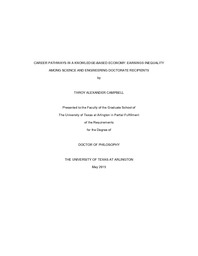
ATTENTION: The works hosted here are being migrated to a new repository that will consolidate resources, improve discoverability, and better show UTA's research impact on the global community. We will update authors as the migration progresses. Please see MavMatrix for more information.
Show simple item record
| dc.contributor.author | Campbell, Throy Alexander | en_US |
| dc.date.accessioned | 2015-07-31T22:09:59Z | |
| dc.date.available | 2015-07-31T22:09:59Z | |
| dc.date.submitted | January 2015 | en_US |
| dc.identifier.other | DISS-13024 | en_US |
| dc.identifier.uri | http://hdl.handle.net/10106/25003 | |
| dc.description.abstract | This dissertation explored the intersectional effects of social factors (i.e., gender, race) and field of study on science and engineering (S&E) doctorate recipients' labor market outcomes (i.e., career paths and salaries). These social factors represent the participants' unique gendered and racialized experiences (Collins, 1999; James & Busia, 1993) within the labor market. The objectives of the study were achieved through a) an examination of participants' employment sector and earning profiles; b) comparative analysis of participants' career paths defined by the sequence of employment sectors in which workers have jobs between 2003-2010; c) modeling of participants salaries in 2010 when taking into account the intersection of gender and race, field of study, employment sector in 2010, and career path types (i.e., number of changes between employment sectors). The study employed four cycles of the Survey of Doctorate Recipients (2003, 2006, 2008, and 2010) data collected by the National Science Board (NSB, 2014). The results revealed that differences in participants' career paths and labor market profiles were largely accounted by social structures and field of study. In addition to these factors, doctorate recipients' career mobility (i.e., number of employment sectors changed during 2003 and 2010) had an effect on average salaries in 2010. The study findings supported three major areas of debate: inequalities experienced by women in the S&E doctorate workforce, inequalities experienced by URM males in the doctorate S&E workforce, and differences between academic and non-academic employment sectors. This study extends the application of the intersection of gender and race/ethnicity framework to a highly educated population, and provides empirical information that may guide future research, and education policies and practices. | en_US |
| dc.description.sponsorship | Adamuti-Trache, Maria | en_US |
| dc.language.iso | en | en_US |
| dc.publisher | Education | en_US |
| dc.title | Career Pathways In A Knowledge-based Economy: Earnings Inequality Among Science And Engineering Doctorate Recipients | en_US |
| dc.type | Ph.D. | en_US |
| dc.contributor.committeeChair | Adamuti-Trache, Maria | en_US |
| dc.degree.department | Education | en_US |
| dc.degree.discipline | Education | en_US |
| dc.degree.grantor | University of Texas at Arlington | en_US |
| dc.degree.level | doctoral | en_US |
| dc.degree.name | Ph.D. | en_US |
Files in this item
- Name:
- CAMPBELL_uta_2502D_13024.pdf
- Size:
- 1.115Mb
- Format:
- PDF
This item appears in the following Collection(s)
Show simple item record


